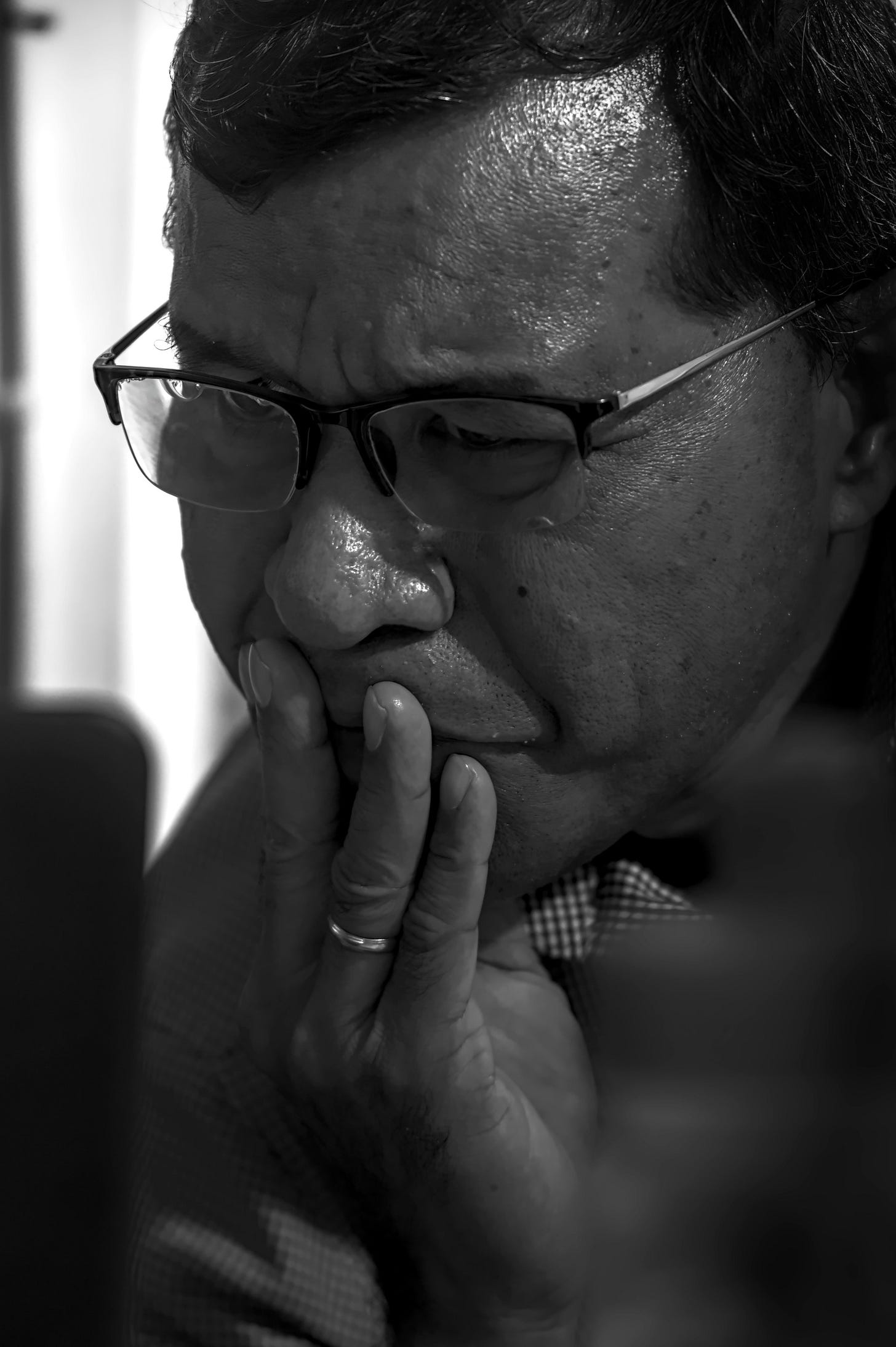Over the years, one of my greatest struggles has been learning to discern the difference between the hand of God, my flesh, and a demonic attack.
Is God orchestrating circumstances to discipline or redirect me?
Or is the devil seeking to discourage and destroy?
And what about the influence of my sinful nature—or the seductive pull of the world around me?
These forces are often intertwined, and distinguishing between them isn’t easy.
For clarity and brevity, I’ll group three of these influences—the world, the flesh, and demonic forces—together. Though distinct, they often operate in unison. As the Puritan Thomas Brooks wrote, the devil is like a fisherman who uses the hook of the world and the bait of the flesh to ensnare the soul. In this article, I’ll treat these three cooperating forces as a unified demonic attack to better contrast them with God’s hand at work.
This question has haunted me for most of my life, but it’s become especially pressing over the past eight years. Why eight? Because that’s when I entered what I’ve come to call God’s Wilderness School—a school and season marked by death, disorientation, depression, and a kind of spiritual pain so deep I often wanted to numb it or escape it entirely.
I wish I could say that I’ve graduated, that those years are behind me, and that I’ve emerged with clarity and a powerful testimony—but I can’t.
I’m still in them.
And I may be for a while.
But God’s Wilderness School has forced me to wrestle with the source of my suffering.
Is this the hand of God?
Or have I somehow yielded to demonic influence?
I’ve asked those questions more times than I can count.
I’ve cried until I had no more tears.
I’ve pounded the floor,
redoubled my prayers,
journaled furiously,
practiced CAT-scan honesty,
and laid out my case to friends like a jury—hoping God, the Judge, might agree with their verdict.
But He does not.
Even if I could convince the whole world of the merits of my case, I would still be wrong.
God is not swayed by even the most earnest arguments of men.
Tears don’t guarantee discernment—nor do they promise deliverance. But they do push me deeper. They compel me to think, pray, and discern whether this is the work of the enemy or the mysterious hand of God. And even then, the answer is rarely clear.
Know this: I have failed more than I’ve succeeded.
I’m sure you have too.
Most days, I’m not even sure what success looks like.
I wanted to be on God’s honor roll, but my spiritual GPA is barely passing—held up only by His grace, not my performance.
I’ve tried to graduate, but I feel stuck in a kind of spiritual Groundhog Day—
reliving the same battles,
faced with the same frustrations,
praying the same prayers,
and waking up to find myself right back where I started.
I’ve had countless conversations with my wife—parsing thoughts, actions, motives—everything.
I’ve shouted.
I’ve pounded walls.
I’ve cried out to heaven, demanding answers.
Silence.
I’ve come obediently.
I’ve come humbly.
I’ve come quietly.
I’ve come in sorrow.
I’ve come pleading.
I’ve come in desperate faith.
I’ve come in anger.
Face flushed, tears streaming, voice hoarse from pleading, yelling, and howling cries for answers.
Silence.
Again.
Again.
Silence.
Yet, God is there in the silence, in a way that I cannot articulate with words.
Even in my faith, I know something I don’t like admitting: I’m not exempt from foolishness.
I must confess: I live haunted by fears of the future.
I carry a gnawing shame, afraid I’ll be exposed as a fraud for presuming God would bless what I’ve built.
I drown in distractions—refreshing my phone again and again, hoping to escape the ache.
Sometimes I wish my life were a dream I could wake from, but I can’t. It’s not a dream. Nor is it a nightmare. It is simply life. Pain is part and parcel of what it means to live in this fallen world.
The line between faith and foolishness is thinner than we like to admit. At times, I feel like a drunk on New Year’s Eve, wobbling through a sobriety test—convinced I’m being faithful, but unsure if I’m just fooling myself.
It’s exhausting.
But it’s necessary.
Still, going through the process doesn’t guarantee clarity when you want it.
And it certainly doesn’t mean you get to graduate from God’s Wilderness School.
There’s no accelerated program.
No class you can CLEP out of.
It’s the slow, painful process of spiritual formation.
God’s timing is not our own. His silence is less about answers and more about trust.
Before I lay out the criteria that have helped me, I need to say this clearly: life rarely gives us a neat either/or. God may lead—or even allow—the devil to act for a time, fully intending to use it for His own purposes (Genesis 50:20). The challenge is that we rarely see that in the moment. So we’re left trying to make sense of it all, grasping for a framework to endure mentally and spiritually.
And that process begins by asking the right questions—honest questions. Questions that might help us discern:
Is this the hand of God?
Or is it the enemy’s work?
Let’s look.
I. Honest Questions
#1. Is the source of your pain drawing you toward or away from God?
A. God’s hand leads us closer to God, even in our discipline or testing. It is in that process that God invites us to draw closer, inviting our repentance, trust, or a refinement of our identity and, quite possibly, our purpose.
Revelation 3:19, “Those whom I love I rebuke and discipline.”
Hebrews 12:11, “No discipline seems pleasant… but later it yields the peaceful fruit of righteousness.”
B. Demonic attack involves separating you from God. The devil and his demons desire to sow doubt, fear, distraction, despair, pride, or sin in your life.
John 10:10, “The thief comes only to steal and kill and destroy…”
John 8:44, “He is a liar and the father of lies.”
Key question to ask yourself: Is this situation pulling me toward greater trust, humility, and righteousness—or into anxiety, bitterness, sin, and spiritual confusion?
#2. What is the fruit that is being produced in you as you go through this?
A. God’s hand often involves discipline or testing. This may include:
· Pain, loss, delay, or pruning as you pursue what God has for you.
· But it will ultimately produce growth in your character, dependence, joy, and peace (although this may not be seen in the moment). Ex: Job, Joseph, Paul’s thorn in the flesh, Jesus in the wilderness are fantastic examples.
B. Satanic attacks often sow chaos, self-accusation, isolation, and confusion about your next steps—all designed to lead to spiritual paralysis. It creates a demonic loop of ineffectiveness, always creating hypothetical scenarios but never landing on what is next.
· Such attacks create relentless temptation, false guilt, crippling shame, division, or seduction in order to keep you ineffective.
Key questions to ask yourself: Is what I am hearing from God bringing about the fruits of the Spirit in my life (Galatians 5:22-23)? Or does it seem to bring about envy and cultivate an attitude of selfish ambition that enables me to cater to what I want rather than what God wants? (James 3:14-18)? Identifying the difference is key.
#3. Does what I believe God is saying to me align with Scripture and the character of God?
A. God’s hand will never contradict His Word, His character, or His covenantal love. He desires you to trust Him.
B. Satanic attacks often use Scripture but twist it (e.g. Matthew 4:6) or manipulate circumstances to get you to question God’s nature and foster unbelief (“Did God really say…?”—Genesis 3:1), or get you to act presumptuously (ex. David taking the census in 1 Chronicles 21:1).
Key questions to ask yourself: Is this situation pushing me to trust God’s promises or question His goodness? Am I tempted to compromise God’s truth for quick relief or self-justification?
#4. Am I willing to allow others to speak into this?
A. God’s hand puts us into community with others (Genesis 2:18; Romans 12:4-5; 1 Corinthians 12:12-27; Hebrews 10:24-25). While there are times when God’s hand is at work in our lives, separating us for a time of refining or revelation (e.g., Elijah in 1 Kings 17:3-4 and Jeremiah 15:17), it is not the norm for ongoing discernment.
Wise, Spirit-filled believers, pastors, mentors, or counselors can help you test the spirits to see if they are from God (1 John 4:1) by asking the hard, but necessary questions in order to discern circumstances and our hearts accurately.
B. Satanic attacks are built upon rejecting, distracting, or distorting godly counsel. Here are five ways the devil seeks to thwart godly counsel.
1. Isolate you from godly community. By getting you to believe that you are self-sufficient and no one understands or that you can figure it out on your own without anyone, whispering things like “No one understands me,” or “I can figure this out on my own” thus catering to self-sufficiency and pride.
Ecclesiastes 4:12, “A cord of three strands is not easily broken.”
Proverbs 18:1, “Whoever isolates himself seeks his own desire; he breaks out against all sound judgment.”
2. Breed suspicion or distrust toward wise people by making you feel isolated and misunderstood. In this scheme, a demon or demons will whisper to you things like, “They don’t get it.” “They’re judging me.” “They have their own agenda.” Rather than surrendering to godly input, the enemy sows doubt, offense, or fear toward those who could help. This distrust may even push away spiritual authority out of paranoia, shame, or resentment.
James 3:14–17, “But if you have bitter jealousy and selfish ambition in your hearts, do not boast and be false to the truth. This is not the wisdom that comes down from above, but is earthly, unspiritual, demonic. For where jealousy and selfish ambition exist, there will be disorder and every vile practice. But the wisdom from above is first pure, then peaceable, gentle, open to reason, full of mercy and good fruits, impartial and sincere.”
3. Surround you with the wrong counsel. You try to surround yourself with people you know are going to agree with you. If the devil can’t isolate you, then he may try to infiltrate your circle with ungodly, worldly, or immature voices. Satanic attacks don’t always silence counsel, they simply want to substitute it.
2 Timothy 4:3, “People will gather around them a great number of teachers to say what their itching ears want to hear.”
1 Kings 12:8, “Rehoboam rejected wise elders and listened to his peers—leading to national disaster.”
4. Twist good counsel into condemnation or confusion. The devil loves to distort godly correction into shame or legalism—turning medicine into poison. God may convict, but the devil wants to condemn—using true things in toxic ways.
Romans 8:1, “There is now no condemnation for those in Christ Jesus.”
5. Prevent you from acting on wise counsel. You may hear true counsel, but you may feel frozen, overwhelmed, or spiritually numb. This scheme is so deceptive because it allows you to know what to do, but equates knowing with doing, thus deceiving the mind and heart from actually accomplishing it.
Galatians 5:7–8, “You were running well. Who hindered you from obeying the truth?”
Key questions to ask yourself: Am I seeking counsel from people I trust? Or am I determined to go it alone? Do I really believe that there is no one who understands? Or am I fearful of what they will say because I know that they won’t cater to what I want?
II. Signs of a Demonic Attack
Now that we have given the questions, let me try to lay out some particulars as to what may be a demonic attack.
· Accusation and shame over already forgiven sin (Revelation 12:10).
· Persistent oppression despite obedience (Job 1:8-12).
· Sudden & irrational division between leaders (Luke 22:3-4; Acts 5:3).
· Lies targeting your identity in Christ (Matthew 4:1-3, 5-6).
· A consistent narrative that says you are worthless and that God doesn’t or won’t care (Romans 8:33-39).
· Intense temptation that feels externally provoked (1 Thessalonians 3:5; 1 Corinthians 7:5).
· Opposition to ministry or mission that seems incessant (1 Thessalonians 2:18).
III. Exercising Discernment
Jesus combated Satan with truth, fasting, and submission to the Father (Matthew 4:1-11). Prayer, especially in spiritual warfare, is essential to discerning if it is an attack that you are experiencing or simply God’s hand directing you to something deeper, more substantial, and rooted in His love.
Fasting, too, can bring clarity to motives by exposing the things that we use to keep us from fully depending on God—our distractions, false comforts, and self-reliance. When these are stripped away, we are better able to hear His voice, see His hand, and walk in step with His will. Even then, it can remain elusive. Circumstances have a way of honing our focus. Allow the Spirit of God to search you (Psalm 139:23) and show you.
Discernment is not a momentary act but a lifelong practice rooted in intimacy with God.
I wish intimacy were easy.
I wish I could graduate and receive my Doctorate in Spiritual Maturity and be done with God’s Wilderness School.
But classes continue—and they may continue until we are released for the eternal holiday.
I can only do one thing on this side.
One exercise of agency.
Get out of bed each day and start over in trust.
Start over in battle.
Start over when I’m numb.
Start over after failure.
“Weeping may tarry for the night, but joy comes with the morning” (Psalm 30:5).
As we walk with Him, we hope to distinguish His voice from the lies of the enemy, the pull of the flesh, and the noise of the world.
While clarity may not come instantly, persistent prayer, honest self-examination, and humble submission to God’s Word and Spirit will guide us.
Guide.
Not escape.
I believe He will reveal what you need in His perfect timing—because He is faithful, and His desire is not to confuse, but to lead you deeper into truth, love, and maturity for His glory and your joy.
Because ultimately, trust is what we are called to do.
And that we do until the eternal holiday comes.




